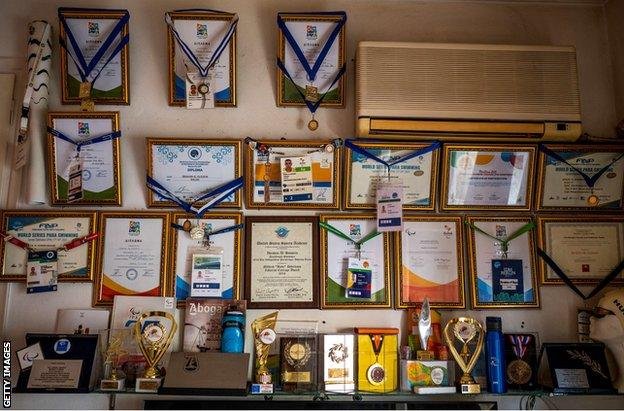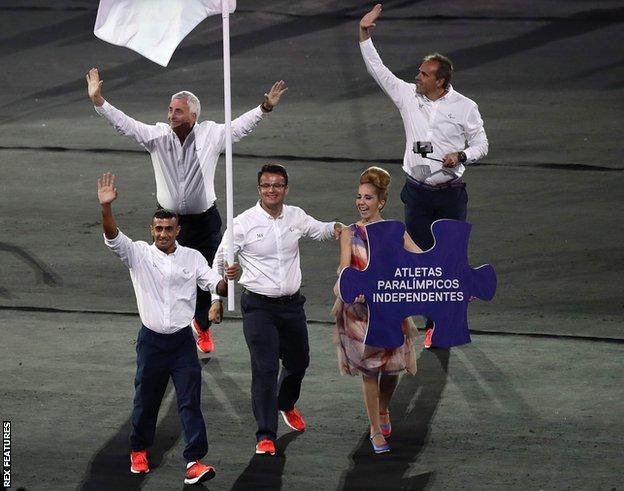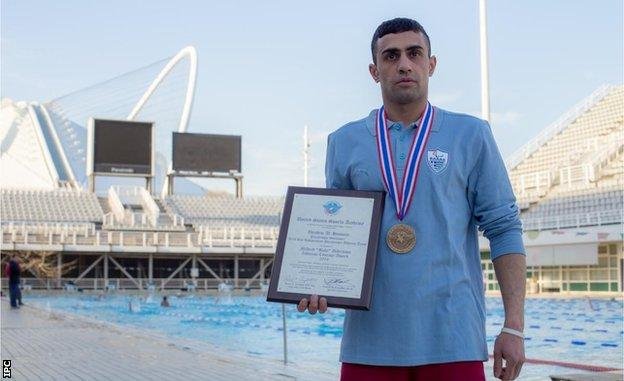 When Al Hussein arrived in Athens, he had no cash and was sleeping tough
When Al Hussein arrived in Athens, he had no cash and was sleeping tough
It was darkish as Ibrahim Al Hussein got here to. He could not transfer and thick mud stuffed the air, blocking out all however a couple of small flames flickering shut by. It was exhausting to breathe.
The shrill high-pitched ringing he may hear was damaged by one other individual faintly crying out close by. Then there was his leg. One thing wasn’t proper and he couldn’t really feel his foot.
“In that second, I did not know if I used to be lifeless or alive,” Al Hussein says now.
Seconds earlier he had dived to the bottom to guard his good friend, shot by a sniper from a close-by rooftop. It was 2012 and the Syrian battle had damaged out within the earlier 12 months.
His household had already fled their dwelling in Deir al-Zor on the Euphrates river, however Al Hussein felt compelled to remain. Then 23, he feared he could be compelled into the military if captured and refusal would have meant sure demise.
Day by day life was a trauma. Bombing had destroyed a lot of what he cherished, whereas water and electrical energy have been minimize and no meals provides may enter the town.
Those that remained shaped a brotherhood. Some days they felt like they have been “trapped in graves” however they saved a neighborhood collectively. They’d die for each other, however hoped they might not should.
“Because the smoke cleared I may nearly make out individuals coming in the direction of me,” Al Hussein recollects. “They’d heard the tank shell detonate and carried me away to security.”
Al Hussein’s decrease proper leg had been blown away and metallic shrapnel was embedded in his nostril, cheek and arm. The blast had landed just some ft away from the spot the place he had dived to guard his good friend, who survived.
With all public companies ceased, a dentist had shaped a makeshift medical facility in a tent the place he may clear wounds and administer some ache aid.
However there was no time to relaxation and no risk of recuperating right here. Al Hussein knew the lifesaving medical remedy he wanted for his leg was merely not out there in Syria.
He and a few associates hatched a plan to flee. They’d attempt to attain neighbouring Turkey, to the north, and cross by river.
“We needed to go at evening as a result of we knew the Syrian military have been patrolling and the Turks would have armed forces too,” he recollects. “We hoped the small boat would go unnoticed.”
With the assistance of fellow travellers, Al Hussein moved between three cities in southern Turkey as he desperately looked for the assistance he wanted.
Most have been capable of apply contemporary dressings for the wound, however antibiotics have been briefly provide, significantly when he had no cash to pay for them.
“Remedy in Turkey wasn’t good in any respect,” Al Hussein says.
“One hospital gave me a prosthetic leg, however I needed to carry instruments with me because the screws would fall out on to the road each 100 metres.
“It additionally damage after I wore it and it triggered additional an infection as a result of the metallic supplies tore via the pores and skin and have been touching the bone.”
He determined to cross the nation, hoping for higher in Istanbul, however was left upset and have become more and more determined.
“I knew that Europe was now my solely choice,” he says. “Folks suggested I’m going again to Izmir, south of the town, the place smugglers may take me.
“It was scary going from sq. to sq. looking for, after which negotiate, with smugglers.”
 Medals and awards on Al Hussein’s wall inside his Athens dwelling
Medals and awards on Al Hussein’s wall inside his Athens dwelling
On 27 February 2014, Al Hussein boarded a small dinghy hoping to journey the quick however probably treacherous distance throughout to Samos Island in Greece.
On common, greater than 8,000 refugees arrive annually. Many extra try the journey however don’t make it – one thing Al Hussein was conscious of.
“I may see the worry within the faces of the opposite travellers, however I had been round demise since being injured in 2012 and if we sank in the midst of the ocean I noticed it as a quicker approach of dying,” he says.
“Sure it was scary, however I used to be in ’emergency mode’ for myself. I used to be preventing to seek out remedy and preventing for a greater life. I knew that if I may make it, then tomorrow could be higher.”
Al Hussein and his fellow travellers made it to Samos and have been quickly rounded up by police and positioned in a refugee camp. With a smile, he describes it as “one of the best day” of his life.
He acquired permission to remain in Greece for six months and Athens was his goal.
“I did not have the cash, however individuals noticed that I used to be half in a wheelchair and half utilizing a strolling stick,” provides Al Hussein. “They have been sympathetic and acquired me a ferry ticket.”
The travelling group have been low on funds and will not help Al Hussein after arriving within the Greek capital. As they continued on in the direction of northern Europe, he stayed.
“These occasions have been very powerful,” he recollects. “I had no cash, could not communicate the language and I needed to stay and sleep on the streets in locations have been the police could not kick us round.
“Some nights I’d don’t have any meals and I must search for fruit in timber or eat grass from the park.”
By probability he met a fellow expat in a kind of metropolis parks. The person, who had left Syria 20 years earlier, provided Al Hussein shelter for the evening and organized a gathering with a physician, Angelos Chronopoulos, who specialised in treating individuals with amputated limbs.
“When the physician noticed I used to be in a wheelchair, he mentioned that is not a scenario he may settle for,” Al Hussein recollects.
“He paid greater than 12,000 euros from his personal pocket to have a picket prosthetic made, for the physiotherapy that helped me be taught to stroll with no stick and for the medicine that handled the an infection. The physician gave me every part. I used to be so completely satisfied.”
Al Hussein couldn’t communicate Greek and took the one job out there to him – cleansing the bogs at an area cafe. He labored daily of the week with no breaks throughout lengthy shifts and was proud to be supporting himself.
“I used to be making a living, which meant I may purchase meals, hire someplace to remain and purchase decorations for my dwelling,” he says.
“However I used to be lacking one thing – sport.”
 Al Hussein’s dad launched him to swimming – however he resisted at first
Al Hussein’s dad launched him to swimming – however he resisted at first
Al Hussein’s introduction to swimming got here through his father, a two-time Asian champion. His dad coached him as a baby, though at first Al Hussein resisted his “strict” regime, preferring judo.
As battle broke out in Syria in 2011, all sports activities services have been compelled to shut, however now settled and protected in Athens, he was determined to return to bodily exercise.
“I spent all my mornings looking for sports activities golf equipment who would settle for me,” says Al Hussein. “I would inform them I was a sportsman, however as a refugee with an damage most rejected me.”
In Might 2014 he discovered a wheelchair basketball crew who would permit him to play – and 12 months later his “prayers have been answered”.
“A swimming membership gave me permission to coach at their facility. After I seemed on the tackle I realised it was the Athens Aquatics Centre,” says Al Hussein, who, on the age of 16, had watched the 2004 Olympics unfold on a small TV in his “idyllic” Syrian dwelling.
“Seeing these Olympics gave me motivation to do sport and though it was a flashback to the previous, it was additionally a glance to a greater future as a result of I had made it to the pool I would at all times dreamt of swimming in.”
For a lot of 2015 he would swim within the morning, play wheelchair basketball within the afternoon after which work on the cafe till late within the night. That very same 12 months he was granted refugee standing and allowed to remain in Greece.
It was a gruelling regime, however it labored for him and, in early 2016, he secured two medals on the Greek Para Swimming Nationwide Championships. Folks started to take word.
“Native journalists started writing about how this refugee injured within the Syrian battle had come to Athens and skilled right here,” Al Hussein says.
“I wished to inform them how essential the game had been in serving to me combine into Greek society and in addition mentally deal with every part I would been going via.”
A month later the United Nations and Greek Paralympic Committee – who have been eager to boost consciousness concerning the refugee scenario within the nation – requested Al Hussein to stroll with the Olympic torch originally of its journey from Athens to Rio, the 2016 host metropolis.
He gratefully accepted and informed reporters afterwards that “though it will be unattainable”, he would nonetheless “love” to take part in a Paralympics and “present what refugees can obtain”.
Moved by his unbelievable journey, simply 10 days later the Worldwide Paralympic Committee provided Al Hussein a spot within the first ‘Unbiased Paralympic Workforce’ – he would go to Rio.
 Al Hussein carries the flag of the primary ‘Unbiased Paralympic Workforce’ at Rio 2016
Al Hussein carries the flag of the primary ‘Unbiased Paralympic Workforce’ at Rio 2016
On 7 September 2016, all was darkish, identical to 4 years earlier.
Al Hussein’s chest was tight and his respiratory quick. Once more there have been muffled sounds he couldn’t correctly distinguish. Now although he stood and knew he was very a lot alive.
Because the curtain was drawn again, Al Hussein took a deep breath, gripped the pole he was carrying and took his first steps inside Brazil’s iconic Maracana Stadium.
The Paralympic opening ceremony flag bearer was hit by a ‘wall of noise’ as 60,000 individuals cheered his arrival. “This have to be a dream,” he whispered to himself; he had come to this point.
After shedding his leg within the battle, paying off smugglers, preventing a life-threatening an infection, dwelling on the streets and consuming grass to remain alive, now the eyes of the world have been upon him.
Al Hussein was unable to problem for a medal at Rio 2016, having solely returned to the game a 12 months earlier. However he travelled dwelling with the distinguished Whang Youn Dai Achievement Award – given to an athlete who “finest exemplifies the spirit of the Video games and evokes and excites the world”.
He has skilled exhausting within the years since, however preparations for Tokyo have been badly affected by the coronavirus pandemic.
“Throughout lockdown I could not go to the pool and it was an actual wrestle for athletes with disabilities,” he says.
“It was financially troublesome as a result of I had no help, nor any competitions and my place of job was shut. However I discovered a approach via – I at all times do.”
Now 32, in Tokyo he might be a part of one other first, the six-strong Paralympic Refugee Workforce and he’s eager to carry out and unfold the story he started to inform 5 years in the past.
“Tokyo marks a big second for unity and hope, however my message particularly for refugees around the globe is to by no means surrender,” says Al Hussein, who will compete within the 100m breaststroke warmth on Thursday.
“There was a number of struggling in my journey, however I hope individuals who see me or examine me realise that even for those who’re a refugee or turn into disabled, life has not stopped.
“It doesn’t matter what struggles you face in your life there may be nonetheless a lot good you are able to do and a lot you’ll be able to obtain.”
 Al Hussein might be considered one of six athletes competing as a part of the Paralympic Refugee Workforce in Tokyo
Al Hussein might be considered one of six athletes competing as a part of the Paralympic Refugee Workforce in Tokyo




